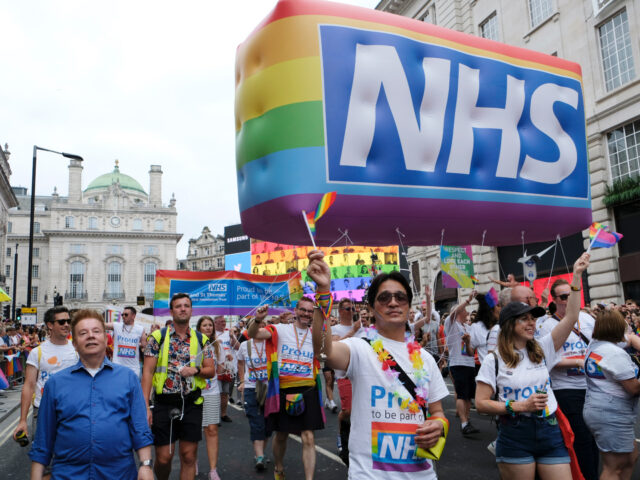Britain’s socialised healthcare system has spent over £1 million on woke LGBTQ+ and racial staff networks, despite persistent claims of underfunding and long waiting lists for patients.
Research from the Taxpayers’ Alliance (TPA) has found that some 493 staff networks are being funded by branches of the National Health Service (NHS) throughout the country. The most prevalent networks are for LGBTQ+ issues, with 101 such groups being funded by the taxpayer, followed by racial networks, of which there are at least 99.
The networks have been found to have put on “tea and rainbow cake” picnics for staff and sessions to discuss personal pronouns. In total, the time spent operating such networks — not including attending events — took up 108,807 staff hours over the past three years and cost the taxpayer £1,081,878, the Daily Mail reported.
In reality, the cost is likely to be much higher, given that only 111 of 230 NHS trusts responded to the Freedom of Information requests.
Explaining the purpose of such schemes, the North Middlesex University Hospital Trust said that “the principal purpose of such staff networks is to inform and support the trust’s aims, values and objectives especially in the promotion of equality, diversity and inclusion in the management of staff and delivery of services’. Specific aims include ‘organising celebration and awareness-raising days and events’.”
LGBTQ 'Equality Index' Used to Award Contracts by UK Health Service Trust https://t.co/MXcEMWUkOm
— Breitbart London (@BreitbartLondon) June 12, 2022
The lead project researcher for the Taxpayers’ Alliance, Elliot Keck said: “Many of the networks are a questionable use of NHS time and taxpayers’ money. While Brits wait patiently for their appointments and operations, NHS middle managers are busy organising right-on lectures and social events. Health chiefs need to scale back some of these unnecessary ‘woke’ networks.”
Conservative MPs also criticised the woke schemes as a waste of money, with David Jones MP saying: “When patients are being denied operations and waiting too long for care, expending taxpayers’ money on networks like this seems wasteful at best and sinful at worst.”
“The funding and staff time going into these groups is symptomatic of the waste within the NHS. The Health Secretary should use it as an example of how existing funds could be spent more efficiently next time bosses ask for more,” Tory MP Sir Christopher Chope added.
Struggle Session: NHS Seminar Attendees Lament ‘Burden’ of ‘Whiteness’, ‘Shame and Guilt’ https://t.co/xeeGlTeVaD
— Breitbart London (@BreitbartLondon) January 19, 2021
The revelation comes amid increasing warnings that the socialised healthcare system will face a “humanitarian crisis” in the winter months, with the NHS already experiencing long waiting times and a shortage of beds and staff. This week, the NHS called on the government to try to alleviate the energy crisis, warning that fuel poverty will force many to live in cold and wet conditions and others to skip meals due to the soaring cost of energy.
NHS Confederation chief executive Matthew Taylor said: “The country is facing a humanitarian crisis. Many people could face the awful choice between skipping meals to heat their homes and having to live in in cold, damp and very unpleasant conditions.
“This in turn could lead to outbreaks of illness and sickness around the country and widen health inequalities, worsen children’s life chances, and leave an indelible scar on local communities.”
Despite the consistent claims from the NHS of being underfunded, the public healthcare system has not been shy about spending money on seemingly non-essential woke issues, such as splashing out nearly £60,000 on painting an LGBTQ+ rainbow zebra crossing during the height of the Chinese coronavirus crisis.
In June, Breitbart London revealed that the Mid Yorkshire Hospitals NHS Trust had paid out £50,000 to award its own staff members medals to pat themselves on the back for staying open during the Wuhan virus pandemic.
Defending the vast sums of money and man-hours spent on woke staff networks, an NHS spokesman said: “While it is down to individual trusts to decide how they best support their own staff, these voluntary networks provide a channel to address concerns from a wide range of staff, which helps improve services for patients.”
How it does this was not explained.
UK Health Service Removes Word ‘Women’ From Menopause Advice Documenthttps://t.co/d0lsH8ACDu
— Breitbart London (@BreitbartLondon) June 30, 2022
Follow Kurt Zindulka on Twitter here @KurtZindulka

COMMENTS
Please let us know if you're having issues with commenting.